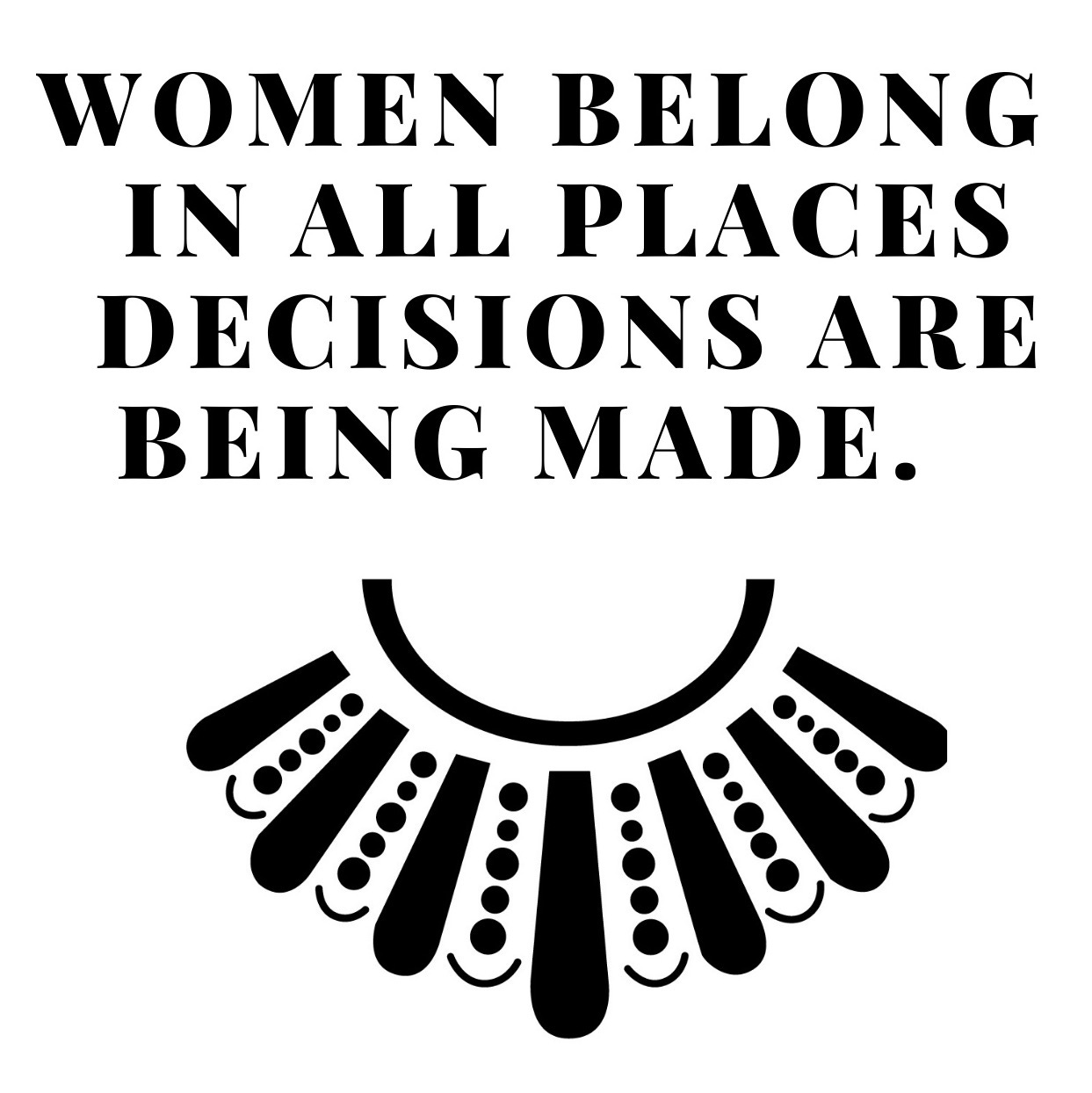My friend and fellow feminist Jackie Sumner gave me a t-shirt sometime during the Trump years with an image of Ruth Bader Ginsberg and her now-famous quote “Women belong in all places where decisions are being made” (a similar t-shirt is on Etsy here). The quote comes from an interview Ginsberg did with USA Today in 2009, on the eve of David Souter’s retirement:
Ginsburg said the court needs another woman. "Women belong in all places where decisions are being made. I don't say (the split) should be 50-50," Ginsburg said. "It could be 60% men, 40% women, or the other way around. It shouldn't be that women are the exception."
Since O'Connor's departure in 2006, oral arguments and the justices' behind-the-scenes discussions on how disputes should be resolved have had a different tone. In the strip-search case and others this term, Ginsburg has revealed a woman's point of view that was strikingly at odds with those of many of her colleagues.
Ginsburg dominated oral arguments in an important case involving alleged discrimination related to pregnancy leaves. She was openly frustrated that some of her male colleagues, in her view, might not have understood the discrimination women face on the job.
She said the arguments in that dispute echoed those of a 2007 case involving Lilly Ledbetter, a 19-year worker at a Goodyear tire factory in Alabama who alleged that her pay dropped over time compared with men who had equal or less seniority. In that case, the court — with Ginsburg vigorously dissenting — narrowly ruled that women could not sue for pay inequities resulting from sex discrimination that had occurred years earlier.
Oral arguments in the pregnancy case were "just, for me, Ledbetter repeated," Ginsburg told USA TODAY, adding that her colleagues showed "a certain lack of understanding" of the bias a woman can face on the job.

President Obama went on to select Sonia Sotomayor to replace Souter. Sotomayor was only the third woman to serve on the Court, and was the first woman of color and the first Latina. Elena Kagan, appointed by Obama in 2010, was the fourth woman (and second Jewish woman, after Ginsberg). After RGB died in 2020, Trump appointed Amy Coney Barrett to fill her seat, the fifth woman to be appointed to the Court in American history. Last year President Biden appointed Ketanji Brown Jackson to serve. She is only the sixth woman, and the first Black woman, to be a Supreme Court justice.
It will be interesting to see how gender shapes the court. Currently, Amy Coney Barrett is a key member of conservative supermajority, blithely supporting the other five (male) members in their support of the patriarchy (women often internalize patriarchal values and uphold them, because they are rewarded for doing so, especially in the ultra-conservative Catholic sect Barrett belongs to).
Even with the U.S. Supreme Court a hot mess of originalism and corrupt politicized decision making (see also the likelihood that Alito is leaking decisions early, wth), at least four women are serving, which is more balanced than the South Carolina Supreme Court is set to become, with the announcement this week that both women who were originally in the running to replace the ONLY woman currently serving, Justice Kaye Hearn, have dropped out of consideration, leaving only Gary Hill in the race. The Court will then be composed of four white men and one Black man, Chief Justice Donald Beatty.
In South Carolina, the Legislature elects Supreme Court judges (Virginia is the only other state that still does this, an overview and history here). I can’t help but think that anti-abortion SC lawmakers are more intensely scrutinizing judicial appointments, after the recent Court decision to protect abortion rights on the basis of privacy. Are they worried that Stephanie McDonald and Aphrodite Konduros, the women originally in the running, would have protected women’s rights?
With Hill’s appointment (expected next month), South Carolina will become one of the only states in the country with an all-male bench (for a report on the depressing state of diversity on all state Supreme Courts, see this report).
Although I’m alarmed that the Legislature is seemingly fine with this complete lack of female representation on the state’s highest court, I remain hopeful because, as we know, men can be feminists too. Fingers crossed that Judge Hill joins his colleagues in improving women’s lives in the state, and maybe give your state representatives a call urging them to address this gender imbalance when Chief Justice Beatty retires next year. Maybe paraphrase RGB while you’re at it. It shouldn’t be, as she said, that women are the exception.




Well said.